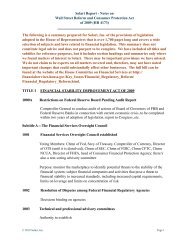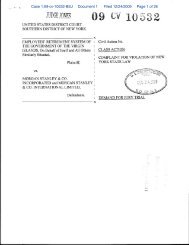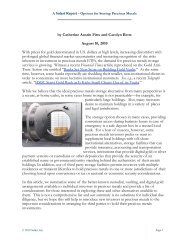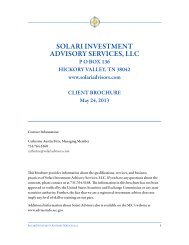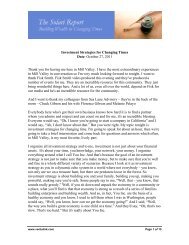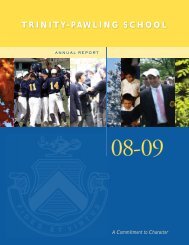Q3 01webb.qxd - Dillon Read & the Aristocracy of Stock Profits
Q3 01webb.qxd - Dillon Read & the Aristocracy of Stock Profits
Q3 01webb.qxd - Dillon Read & the Aristocracy of Stock Profits
You also want an ePaper? Increase the reach of your titles
YUMPU automatically turns print PDFs into web optimized ePapers that Google loves.
THE CRUEL TWIST<br />
IS THAT CITIZENS<br />
ARE FUNDING<br />
THE<br />
FINANCIAL RUIN<br />
THAT IS<br />
KILLING THEM<br />
AND THEIR<br />
CHILDREN.<br />
SIX<br />
WAYS<br />
TO<br />
CENTRALISE<br />
LOCAL<br />
CAPITAL<br />
S ANDERS R ESEARCH A SSOCIATES<br />
dollars <strong>of</strong> wholesale capital movements. It is not just defaulted HUD<br />
mortgages, US Treasury market interventions, Federal Reserve bailouts <strong>of</strong> hedge<br />
funds and IMF bailouts <strong>of</strong> Wall Street investors, money laundering out <strong>of</strong><br />
Russia or narcotics trafficking.<br />
Now I see <strong>the</strong> signs <strong>of</strong> financial holocaust through <strong>the</strong> eyes <strong>of</strong> people who are<br />
being destroyed. Their currency is debased. Their children are targets <strong>of</strong> both<br />
“legal” and “illegal” drug trafficking and are condemned to learn in dumbeddown<br />
schools. Their small business equity is being extracted from under <strong>the</strong>m.<br />
It is <strong>the</strong>y who are carrying <strong>the</strong> burden <strong>of</strong> taxes without <strong>the</strong> benefits that government<br />
investment is supposed to provide. The cruel twist is that citizens are<br />
funding <strong>the</strong> financial ruin that is killing <strong>the</strong>m and <strong>the</strong>ir children.<br />
Now I understand <strong>the</strong> process by which <strong>the</strong> rich get rich and <strong>the</strong> poor get<br />
exhausted. I see it through <strong>the</strong> eyes <strong>of</strong> <strong>the</strong> ladies who run <strong>the</strong> food marts; <strong>the</strong><br />
farmers who can not cover <strong>the</strong>ir costs; <strong>the</strong> small town banker who makes<br />
character loans; <strong>the</strong> teenagers who deal and take <strong>the</strong> drugs; <strong>the</strong> mo<strong>the</strong>rs who try<br />
to stop <strong>the</strong> schools from forcing <strong>the</strong>ir kids to take Ritalin; and <strong>the</strong> small<br />
business people who try to make it through life honestly. They are overwhelmed<br />
by <strong>the</strong> sadness <strong>of</strong> what <strong>the</strong>y see happening and do not understand.<br />
I used what I had learned about how <strong>the</strong> money worked to destroy Hamilton<br />
Securities Group to see how <strong>the</strong> money worked to destroy neighbourhoods and<br />
<strong>the</strong> people in <strong>the</strong>m—one neighbourhood at a time. Families and neighbourhoods<br />
are <strong>the</strong> basic building blocks <strong>of</strong> <strong>the</strong> global economy. When <strong>the</strong> bubble bursts,<br />
all <strong>the</strong> key decisions must first be made <strong>the</strong>re at ground zero. So that is where<br />
we shall start.<br />
HOW THE MONEY WORKS: THE DESTRUCTION OF NEIGHBOURHOODS<br />
The model works about <strong>the</strong> same in every country, although <strong>the</strong> particulars<br />
vary between domestic and international agencies and <strong>the</strong> military and<br />
enforcement bureaucracies. Some call it <strong>the</strong> securitisation process. Some call it<br />
corporatisation. Some call it privatisation. Some call it globalisation. What this<br />
means in layman’s terms is that <strong>the</strong> management <strong>of</strong> resources is centralised.<br />
This is done through a system <strong>of</strong> securitisation based on privilege and coercion<br />
ra<strong>the</strong>r than performance and <strong>the</strong> rule <strong>of</strong> law.<br />
From <strong>the</strong> viewpoint <strong>of</strong> <strong>the</strong> neighbourhood <strong>the</strong>re are six ways to centralise local<br />
capital:<br />
n ..First, you consolidate all retail sales into a few large corporations,<br />
including franchise operations, cutting out local small business.<br />
n ..Second, you outsource (“privatise”) all local government functions<br />
to a few large corporations or subject <strong>the</strong>m to such an overwhelming<br />
amount <strong>of</strong> federal regulation that <strong>the</strong>y can be controlled and<br />
managed for <strong>the</strong> benefit <strong>of</strong> a few large corporations and <strong>the</strong>ir<br />
investors.<br />
n ..Third, you buy up all <strong>the</strong> land and real estate, or encumber <strong>the</strong>m<br />
with mortgages in a way that is as pr<strong>of</strong>itable as possible and allows<br />
you to get control when you want it.<br />
2001 THIRD Q UARTER C OMMENTARY - PAGE 7




